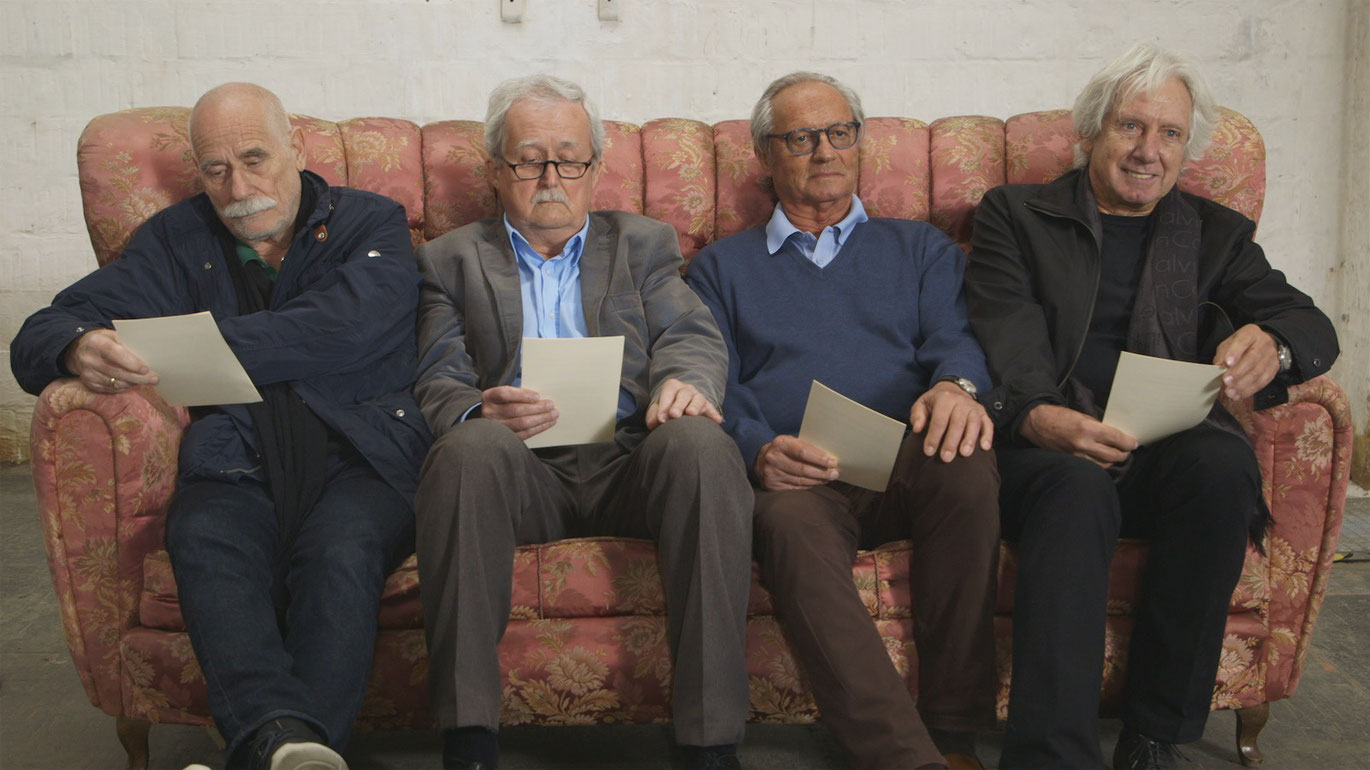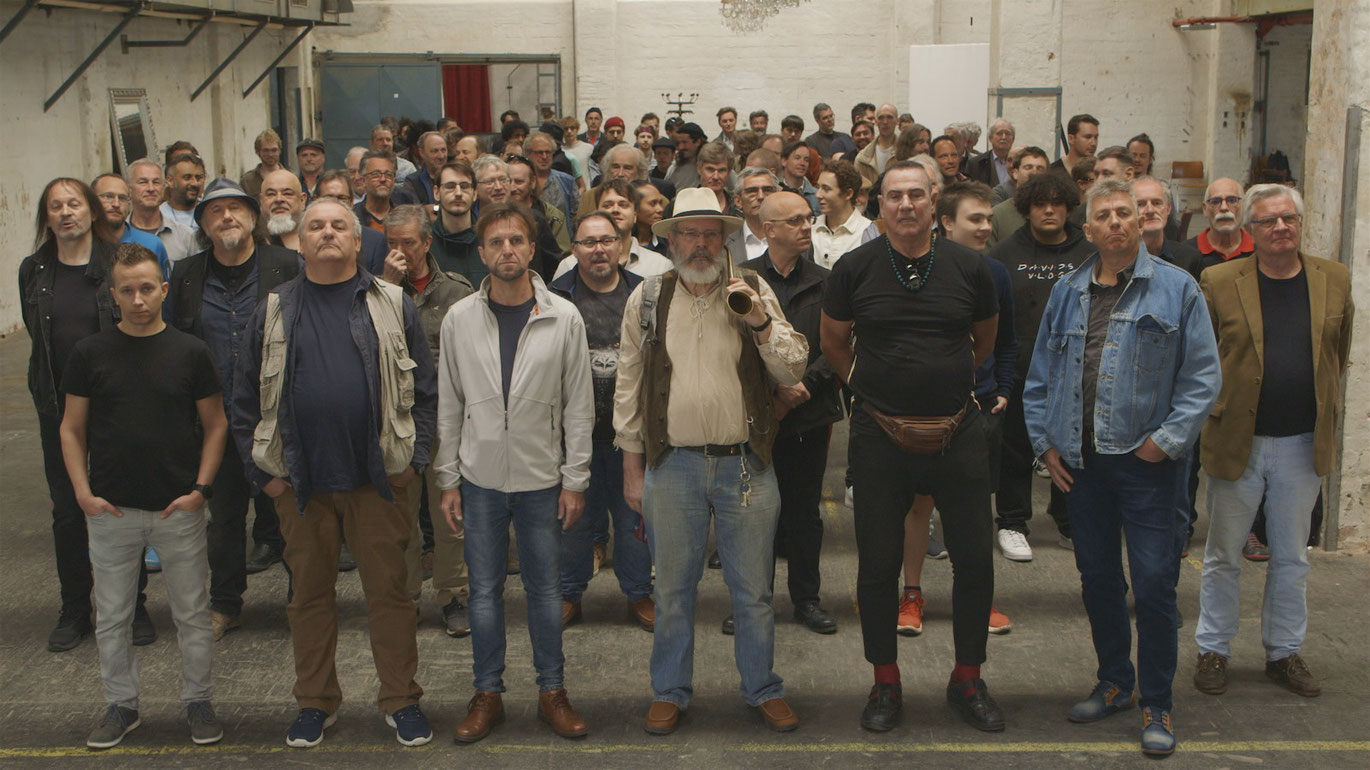MUTZENBACHER
With an ad in a newspaper, Ruth Beckermann announces a casting call for a film based on a well-known pornographic text. The film, MUTZENBACHER, sees a hundred men confronted with excerpts from the novel, “Josefine Mutzenbacher or The Story of a Viennese Whore”, in an age when sex is more ubiquitous than ever, and yet at same time is met with a highly charged moral environment.
For more than a hundred years, the novel, “Josefine Mutzenbacher or The Story of a Viennese Whore”, has been the subject of controversy for its lustful depiction of child and female sexuality. Though published anonymously, the novel has over the years been attributed to the Austrian writer, Felix Salten (the author of “Bambi”), and despite being banned for a period has also been celebrated as a world-renowned work of Viennese literature. With an ad in a newspaper, Ruth Beckermann announces a casting call for a film based on the well-known pornographic novel: “Looking for men between the ages of 16 and 99.” Shot in a former coffin factory, the film, MUTZENBACHER, sees a hundred readers confronted with excerpts from the text. And just as in real life, reading these “offensive” passages on the set evokes not only personal memories and erotic fantasies, but also reactions of denial, rejection, self-distancing and strategies of justification. We live and love in an age when sex is more ubiquitous than ever, and yet at the same time is met with a highly charged moral environment.
Ruth Beckermann - director's statement MUTZENBACHER
As a child in Vienna, I stumbled upon the story of Mutzenbacher relatively early. Like many others, I read it as an introduction to the practice of the art of love. You could find pirated editions in your parents’ nightstand or under the counter at a bookstore and finally, in the 1970s, as a paperback available everywhere. It fit right into the zeitgeist of the so-called sexual revolution, and yet it wasn’t even that modern. After all, the novel’s protagonist, a 50-year-old woman, recalls her childhood and youth towards the end of the 19th century. She tells of cramped living conditions in the Vienna suburbs, and of craftsmen and workers. Above all, it was her language, her Viennese peppered with countless expressions in dialect for sexual organs, indeed for the whole of sexuality itself, that were hardly in use anymore among my generation. And yet, in the Vienna of the 1960s, you could still feel the atmosphere of the novel, in the jostle around the communal water tap or in the unwanted intimacy of the other tenants in the apartment blocks, where the toilets were in the hallway. I especially remember the heat and confinement of the trams that in the summer brought us to the Old Danube, but also the freedom that we children had, while our parents busied themselves with reconstructing and achieving prosperity. And of course, all those expressions that you picked up here and there weren’t inhibited by any sense of shame or correctness. Today, sex is in all the media. At the same time, sex isn’t an issue. How can this be? Where does the way the Western world deals with sex originate from? In the 1970s, French philosopher Michel Foucault examined the West’s relationship to sexuality and came to the conclusion, “that what is peculiar to modern societies is not that they confined sex to a shadow existence, but that they dedicated themselves to speaking of it ad infinitum, while exploiting it as the secret.” The secret to be confessed in the confessional box, admitted before the policeman and shared in confidence with the doctor. The priest, the pope, the judge, the physician, and the media. With this film, I have tried, among other things, to break up – for a moment – this hegemony.- Ruth Beckermann, January 2022
Ruth Beckermann - Regie-Statement zu MUTZENBACHER
Als Wiener Kind stolperte ich relativ früh über die Geschichte der Mutzenbacher. Wie viele andere las ich sie auch als Einführung in die Praxis der Liebeskunst. Man fand sie als Raubdruck im Nachtkastl der Eltern oder unter dem Ladentisch eines Buchhändlers und schließlich, in den 1970er Jahren als überall erhältliches Taschenbuch. Sie passte in den Zeitgeist der sog. sexuellen Revolution und war doch so gar nicht modern. Schließlich erinnert sich die Protagonistin des Romans als 50jährige Frau an ihre Kindheit und Jugend gegen Ende des 19. Jahrhunderts. Sie erzählt von engen Wohnverhältnissen in der Wiener Vorstadt, von Handwerkern und Arbeitern. Vor allem ihre Sprache, ihr Wienerisch, gespickt mit unzähligen Mundart-Ausdrücken für die Geschlechtsorgane, ja die Geschlechtlichkeit schlechthin, waren meiner Generation kaum mehr geläufig. Und doch spürte man im Wien der 60er Jahre noch die Atmosphäre dieses Romans, wenn man das Gedränge um die Bassena erlebte oder die ungewollte Intimität der Bewohner von Zinshäusern, wo sich die Klosetts am Gang befanden. Ich erinnere mich besonders an die Hitze und Enge in den Straßenbahnen, die einen im Sommer an die Alte Donau brachten, aber auch an die Freiheit, die wir Kinder hatten, deren Eltern mit Wiederaufbau und Wohlstand beschäftigt waren. Und natürlich waren die Ausdrücke, die man da und dort aufschnappte, von keinerlei Scham oder Korrektheit gehemmt. Heute ist Sex in allen Medien. Zugleich ist Sex kein Thema. Wie kann das sein? Woher kommt die Art und Weise, wie die westliche Welt mit Sexualität umgeht? Der französische Philosoph Michel Foucault untersuchte in den 1970er Jahren das abendländische Verhältnis zur Sexualität und kam zu dem bis heute gültigen Schluss, „dass die modernen Gesellschaften sich nicht dadurch auszeichnen, dass sie den Sex ins Dunkel verbannen, sondern dass sie unablässig von ihm sprechen und ihn als das Geheimnis geltend machen.“ Das Geheimnis muss im Beichtstuhl gestanden, vor dem Polizisten zugegeben und dem Arzt vertraulich mitgeteilt werden. Wer spricht also über Sex? Der Pfarrer, der Papst, der Richter, der Mediziner und die Medien. Mit diesem Film habe ich unter anderem versucht, diese Hegemonie für einen Moment aufzubrechen.
MUTZENBACHER
2022
Austria
100 min
Documentary
German
English, french, italian, spanish



